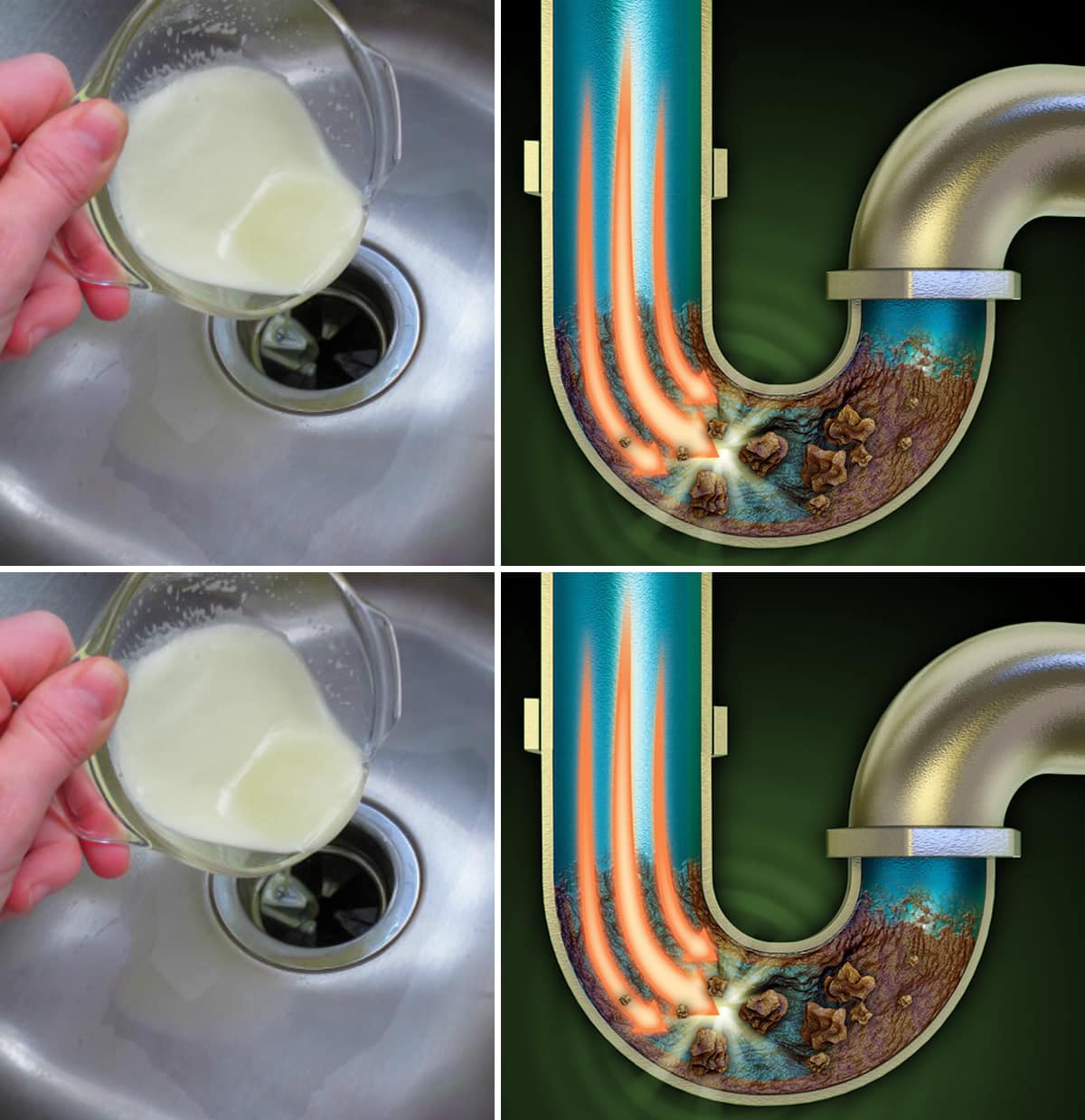ADVERTISEMENT
- After the baking soda, pour in 1/2 cup of white vinegar. The combination of the two ingredients creates a fizzy, bubbling reaction that helps to loosen buildup, dissolve clogs, and neutralize odors.
- Allow the vinegar and baking soda to sit and fizz for about 10-15 minutes. During this time, they’ll work together to break down organic material and dissolve any gunk clogging your pipes.
Step 3: Pour Boiling Water
- After the fizzing has subsided, boil 2-3 cups of water (you can use a kettle, microwave, or stovetop).
- Carefully pour the boiling water down the drain in a steady stream. The hot water helps to flush away the loosened debris and further cleans the pipes.
Step 4: Repeat if Necessary
- If the drain is still sluggish or the smell persists, you can repeat the process one more time for extra cleaning power. For stubborn clogs, use a plunger after the vinegar and baking soda treatment to dislodge any blockages.
Step 5: Flush with Cold Water (Optional)
- After the hot water has been poured, you can give the drain a final rinse with cold water. This helps to solidify any remaining grease or fatty substances, preventing them from sticking to the sides of the pipes.
Additional Tips to Maintain Clean Drains:
- Use a Drain Strainer: A simple drain strainer can help catch hair, food particles, and other debris before they go down the drain, reducing the frequency of clogs.
- Avoid Pouring Grease Down the Drain: Grease can harden inside your pipes, causing serious blockages. Always dispose of cooking oils and fats in the trash, not down the drain.
- Regular Maintenance: Clean your drains every 1-2 months using the baking soda and vinegar trick to keep them in tip-top shape.
- Keep Your Pipes Grease-Free: Once a month, flush your drains with hot water to prevent grease buildup. You can also add a teaspoon of dish soap to your hot water, which will help break up any lingering oils.
Why This Works
- Baking Soda: The mildly abrasive nature of baking soda helps to scrub the sides of pipes, breaking down grease and organic matter that can accumulate over time. It also neutralizes odors by balancing pH levels.
- Vinegar: The acidic properties of vinegar dissolve mineral deposits, soap scum, and other stubborn buildups inside the drain. It also acts as a natural deodorizer.
- Boiling Water: Hot water loosens up stubborn debris, grease, and soap, making it easier for the baking soda and vinegar to break down and flush out the pipes.
When to Call a Plumber
While the baking soda and vinegar method is highly effective for most minor clogs and cleaning, there are times when you may still need to call in the professionals:
- Persistent or Severe Clogs: If your drain is completely blocked, or the DIY method doesn’t seem to work, a plumber will have specialized tools (like a drain snake or hydro jet) to clear the blockage without damaging your pipes.
- Tree Root Intrusion: In older homes, tree roots can invade your pipes, causing serious clogs that need professional attention.
- Frequent Drain Issues: If you’re noticing consistent slow drainage or recurring clogs, it could be a sign of deeper issues with your plumbing system, such as misaligned pipes or major buildup.
Final Thoughts
Cleaning your drains and pipes doesn’t have to be a complicated or expensive process. With a few simple household ingredients—baking soda, vinegar, and boiling water—you can quickly and easily clear clogs, freshen up your drains, and maintain a healthy plumbing system. This method is safe, effective, and perfect for preventing future problems.
Regular drain maintenance is key to preventing bigger, more expensive plumbing issues. So, the next time your drain is running slow or starts to smell, give this easy home trick a try before picking up the phone to call the plumber. You’ll be amazed at how well it works—and you’ll save money in the process!
ADVERTISEMENT
